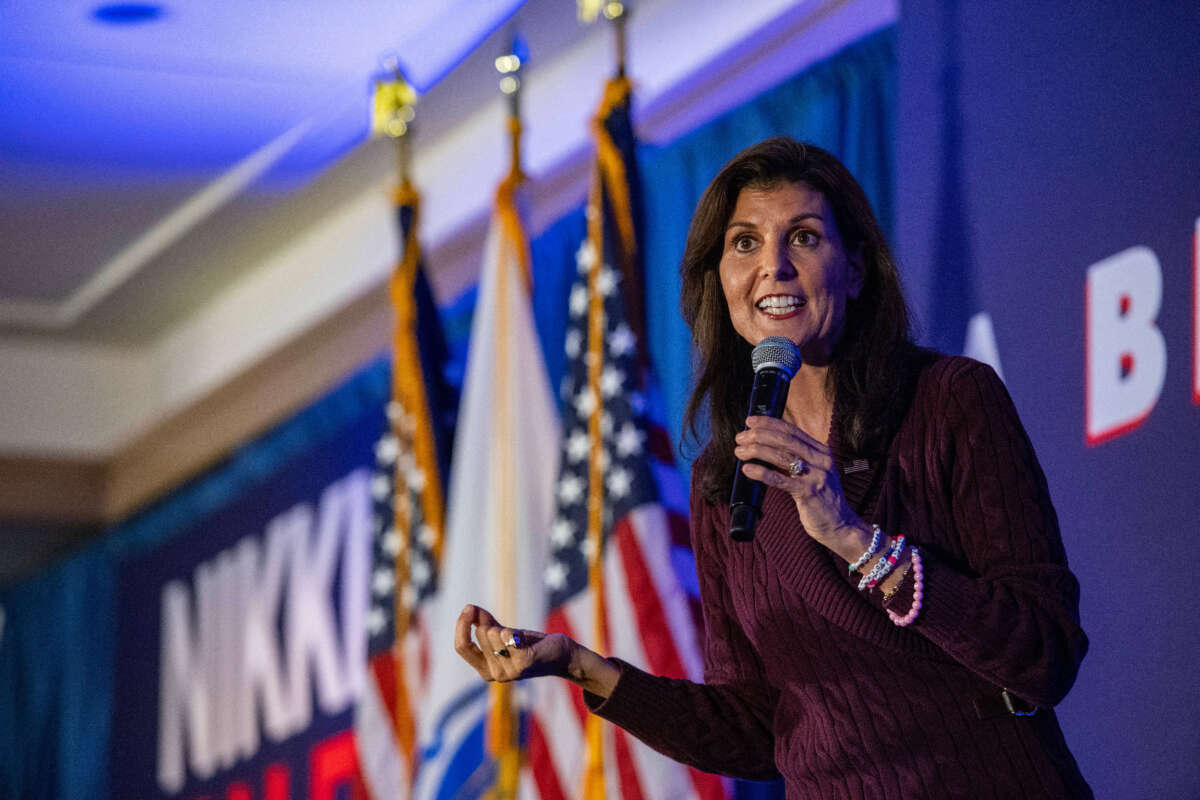Truthout is a vital news source and a living history of political struggle. If you think our work is valuable, support us with a donation of any size.
On Sunday, Republican presidential candidate Nikki Haley won the primary contest in Washington D.C., winning nearly double the votes secured by former President Donald Trump.
The contest is the first win for Haley in a series of primary and caucus events that have taken place so far, and is unlikely to change the trajectory of the Republican nominating process. Still, the win is historic, as it’s the first time a woman has won a GOP primary election in the history of the party, and may provide further evidence that Trump’s sizable base is dwindling by a small but significant amount.
The turnout for the primary was dismal — only 2,030 votes were cast in the mainly Democratic-leaning federal district. Of those who did vote, Haley attained 62.8 percent of support, with Trump garnering just 33.3 percent.
The winner-take-all contest allotted 19 delegates to Haley. As of Monday afternoon, the former South Carolina governor and United Nations ambassador has received 43 delegates, while Trump has collected 247 delegates so far.
For a Republican candidate to win the nomination, they must attain 1,215 delegates. Trump could come close to that total if he sweeps the “Super Tuesday” slate of 16 GOP primary states voting tomorrow. But even if he does, he’ll need a few additional states to secure the Republican Party’s presidential nomination.
After the results of the D.C. contest, both candidates’ respective spokespeople used the race’s proximity to the nation’s capital as a political talking point.
“It’s not surprising that Republicans closest to Washington dysfunction are rejecting Donald Trump and all his chaos,” said Haley spokesperson Olivia Perez-Cubas.
“While Nikki has been soundly rejected throughout the rest of America, she was just crowned Queen of the Swamp by the lobbyists and D.C. insiders that want to protect the failed status quo,” Trump press secretary Karoline Leavitt countered.
Trump weighed in on his loss to Haley on Truth Social, claiming in what appears to be sour grapes that it was the outcome he had secretly been hoping for.
“I purposely stayed away from the D.C. Vote because it is the ‘Swamp,’ with very few delegates, and no upside,” Trump claimed. “[Haley] spent all of her time, money and effort there.”
Despite Trump’s insistence that his loss was a purposeful “gimme” to Haley, there are signs that his base of support within the Republican Party is shrinking, albeit by a small portion.
Last week, for example, Trump handily won the Michigan primary race against Haley. However, 3 in 10 voters supported her and other options on the ballot, indicating that they weren’t convinced that Trump is the best choice to run as the Republican nominee for a third straight presidential election cycle.
An NORC analysis of three nominating contests before Michigan suggests that, in races where Trump hasn’t defeated Haley by larger margins, he may lose some of those voters in the general election race against incumbent President Joe Biden. According to that analysis, one in five GOP primary-goers who voted against him probably won’t vote for him in November, either, amounting to a significant portion of the electorate in a race that will likely be tight.
An inspection of data prior to those primary races by Political Wire’s Taegan Goddard noted that Trump’s polling average is higher than his electoral outcomes so far. Indeed, Michigan was the fourth straight race where Trump underperformed based on the predicted FiveThirtyEight polling averages, which “could call into question the general election polling showing him leading Biden,” Goddard said.
A terrifying moment. We appeal for your support.
In the last weeks, we have witnessed an authoritarian assault on communities in Minnesota and across the nation.
The need for truthful, grassroots reporting is urgent at this cataclysmic historical moment. Yet, Trump-aligned billionaires and other allies have taken over many legacy media outlets — the culmination of a decades-long campaign to place control of the narrative into the hands of the political right.
We refuse to let Trump’s blatant propaganda machine go unchecked. Untethered to corporate ownership or advertisers, Truthout remains fearless in our reporting and our determination to use journalism as a tool for justice.
But we need your help just to fund our basic expenses. Over 80 percent of Truthout’s funding comes from small individual donations from our community of readers, and over a third of our total budget is supported by recurring monthly donors.
Truthout has launched a fundraiser to add 432 new monthly donors in the next 7 days. Whether you can make a small monthly donation or a larger one-time gift, Truthout only works with your support.
